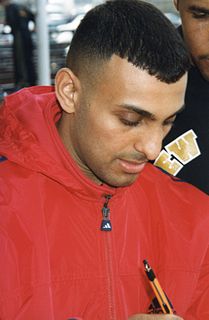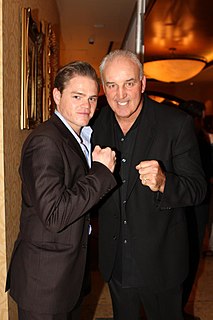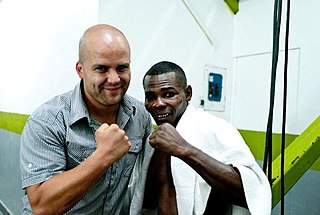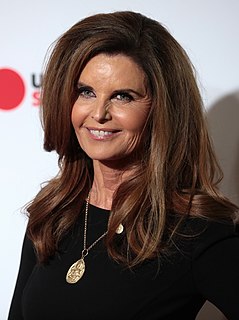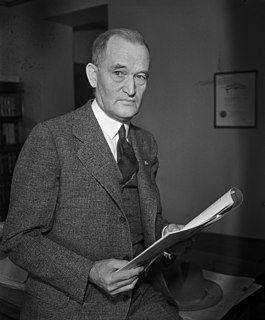A Quote by Naseem Hamed
I want to be remembered as the man who changed the pay scale for featherweights, who put the sparkle back in boxing after Muhammad Ali left, the man who took risks with his ring entrance, the man who, before the fight, would do a front flip into the ring without even thinking about turning an ankle, and then knocking his man out. I mean out.
Related Quotes
Muhammad Ali inside the ring and Muhammad Ali outside the ring were totally different men; his abrasive, magnetic daring and infectious self-love outside the ring galvanized the world and distracted many from his sniper's precision. He was a heavyweight with the fluttering gracefulness of a middleweight.
There came to him an image of man’s whole life upon the earth. It seemed to him that all man’s life was like a tiny spurt of flame that blazed out briefly in an illimitable and terrifying darkness, and that all man’s grandeur, tragic dignity, his heroic glory, came from the brevity and smallness of this flame. He knew his life was little and would be extinguished, and that only darkness was immense and everlasting. And he knew that he would die with defiance on his lips, and that the shout of his denial would ring with the last pulsing of his heart into the maw of all-engulfing night.
The Honorable Elijah Muhammad says that the black man in America, for the past 400 years, has been like a boy in the white man's house, begging the white man for a job, for food, clothing and shelter. And then after the white man provides him with all of these things, he turns around and get - has the nerve to get angry at the white man when the white man tries to control his life.
Down these mean streets a man must go who is not himself mean, who is neither tarnished nor afraid...He is the hero, he is everything. He must be a complete man and a common man and yet an unusual man. He must be, to use a rather weathered phrase, a man of honor, by instinct, by inevitability, without thought of it, and certainly without saying it. He must be the best man in his world and a good enough man for any world
Some may say that such a girl is not ready for a relationship with a man, especially a man in his late sixties. But to that I say: We don't know anything. We don't know how to cure a cold or what dogs are thinking. We do terrible things, we make wars, we kill people out of greed. So who are we to say how to love. I wouldn't force her. I wouldn't have to. She would want me. We would be in love. What do you know. You don't know anything. Call me when you've cured AIDS, give me a ring then and I'll listen.
His head was swimming, and he was far from certain even of the direction they had been going in when he had his fall. He guessed as well as he could, and crawled along for a good way, till suddenly his hand met what felt like a tiny ring of cold metal lying on the floor of the tunnel. It was a turning point in his career, but he did not know it. He put the ring in his pocket almost without thinking; certainly it did not seem of any particular use at the moment.
I can't turn around without hearing about some 'civil rights advance's White people seem to think the black man ought to be shouting 'hallelujah's Four hundred years the white man has had his foot-long knife in the black man's back — and now the white man starts to wiggle the knife out, maybe six inches! The black man's supposed to be grateful? Why, if the white man jerked the knife out, it's still going to leave a scar!
Quincy [Jones] is one of the greatest world figures, of all-time. I mean he's up there with Muhammad Ali, as far as I'm concerned. His humanitarian work, his contribution to the world and music - he's really an amazing man. Even political divides don't affect his humanity. So, to me, that was extremely meaningful.
Last night I thought about all the kerosene I've used in the past ten years. And I thought about books. And for the first time I realized that a man was behind each one of the books. A man had to think them up. A man had to take a long time to put them down on paper. And I'd never even thought that thought before...It took some man a lifetime maybe to put some of his thoughts down, looking around at the world and life, and then I come along in two minutes and boom! it's all over.
When a man sought knowledge, it would not be long before it could be seen in his humbleness, his sight, upon his tongue and his hands, in his prayer, in his speech and in his disinterest (zuhd) in worldly allurements. And a man would acquire a portion of knowledge and put it into practice, and it would be better for him than the world and all it contains - if he owned it he would give it in exchange for the hereafter.
